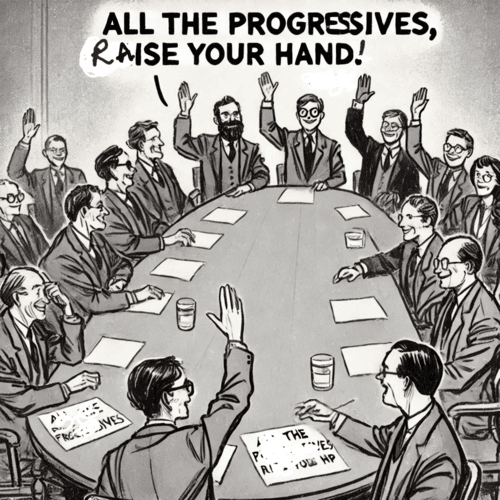Covenant Theology & Dispensationalism: Their Progressive Variants
In our previous discussion, we explored the traditional frameworks of Covenant Theology and Dispensationalism, examining how the two approaches offer different ways of understanding God’s work throughout Scripture. Now, let’s dive into how these frameworks have evolved in recent decades. Just as modern technology often bridges gaps between older systems, newer theological approaches have emerged that seek to address some of the limitations of the traditional frameworks while preserving their core insights. These “progressive” variants have become increasingly influential in contemporary biblical scholarship and church life.
PROGRESSIVE DISPENSATIONALISM: A MODERN REFINEMENT
Progressive Dispensationalism emerged in the late 20th century as scholars sought to address some of the perceived shortcomings of traditional dispensationalism. Rather than seeing God’s different dispensations as entirely distinct from each other, this view recognises more continuity between them—like overlapping chapters in a book, rather than completely separate stories.
A key distinctive of Progressive Dispensationalism is its view on how God’s kingdom program unfolds. The kingdom is seen as “already but not yet”—partially present in the church age but awaiting full manifestation in the millennium. This perspective helps bridge the gap between traditional Dispensationalism’s future focus and Covenant Theology’s present emphasis.
Another significant modification involves the relationship between Israel and the Church. While maintaining their distinctiveness, Progressive Dispensationalism sees more continuity between these groups than traditional Dispensationalism does. Both are viewed as part of God’s single plan, though playing different roles in it. Think of them as different instruments in the same orchestra, each with unique parts but contributing to the same symphony.
PROGRESSIVE COVENANTALISM: A FRESH PERSPECTIVE
Progressive Covenantalism offers a third way between traditional Covenant Theology and Dispensationalism. This newer approach emphasises reading the Bible as one unified story that progressively reveals God’s kingdom through a series of divine covenants. Unlike traditional Covenant Theology, it doesn’t structure everything around the idea of one overarching covenant of grace.
This framework places special emphasis on how each biblical covenant finds its fulfillment in Christ. Rather than focusing on either continuity (like Covenant Theology) or discontinuity (like Dispensationalism), Progressive Covenantalism examines how God’s promises and plans progress and develop throughout Scripture. It’s like watching a flower bloom—each stage builds upon and fulfils what came before.
KEY DISTINCTIONS BETWEEN THE PROGRESSIVE APPROACHES
While both Progressive Dispensationalism and Progressive Covenantalism represent moves toward middle ground, they approach this convergence from different starting points, thus maintaining their key distinctives.
Progressive Dispensationalism maintains the basic dispensational structure but sees more continuity between the dispensations—rather like scenes flowing together in a movie and less like separate acts in a play. It still affirms a future for ethnic Israel and maintains some distinction between Israel and the Church, though seeing them as more closely related than traditional Dispensationalism does.
Progressive Covenantalism, in contrast, begins with the unity of God’s plan but emphasises how it unfolds through distinct covenantal relationships. Unlike Progressive Dispensationalism, it sees the Church as the culmination of God’s purposes for Israel, not as a separate track running alongside it. While Progressive Dispensationalism maintains modified versions of the traditional dispensations, Progressive Covenantalism organises Bible history around the major covenants (Noahic, Abrahamic, Mosaic, Davidic, New) without trying to fit them into dispensational categories.
Another crucial difference lies in their view of the future. Progressive Dispensationalism maintains a modified form of premillennialism with a distinct future for Israel, whereas Progressive Covenantalism typically sees Old Testament promises to Israel as being fulfilled in Christ and the Church, while potentially maintaining a future large-scale conversion of ethnic Jews.
Think of it this way: Progressive Dispensationalism sees God’s plan as having two branches (Israel and the Church) that remain distinct but grow closer together, while Progressive Covenantalism sees one tree where the Church represents the natural growth and fulfillment of God’s promises to Israel.
Practical Implications for Christian Life
These theological frameworks significantly impact how we approach various aspects of Christian life and ministry. For instance, they influence our:
- Understanding of Biblical Ethics: Each framework offers different perspectives on how Old Testament laws apply to Christians today. The progressive approaches generally help us see both the changes and connections between Old and New Testament teachings, guiding how we apply biblical principles to modern situations.
- Worship and Church Practice: These viewpoints shape how churches approach everything from baptism to the role of the Old Testament in Christian worship. They influence decisions about church governance, the practice of spiritual gifts, and the observance of religious ceremonies.
- Mission and Evangelism: Each framework provides different motivations and methods for global missions. While all emphasize sharing the gospel, they might differ in how they understand the relationship between evangelism and social action, or how they view the role of Israel in God’s ongoing plan.
COVENANT THEOLOGY & DISPENSATIONALISM: MODERN DEVELOPMENTS
Today’s theological landscape shows increasing appreciation for insights from multiple frameworks. Scholars and pastors tend to draw from the strengths of different approaches while maintaining their primary theological orientation. This has led to richer dialogue and deeper understanding across traditional dividing lines.
Recent scholarship has particularly focused on:
- Biblical theology that emphasizes the grand narrative of Scripture
- The relationship between the biblical covenants and God’s kingdom
- Fresh perspectives on the role of Israel in God’s ongoing plans
- New approaches to prophetic and apocalyptic literature
CONCLUSION: FINDING OUR WAY FORWARD
As we conclude our exploration of these theological frameworks, let’s remember each approach attempts to honour Scripture and understand God’s plans more clearly. Whether we find ourselves drawn to traditional Covenant Theology, classic Dispensationalism, or one of the progressive approaches, the key is to remain humble and continually engaged with Scripture.
May we each strive to:
- Study Scripture first, frameworks second
- Learn from multiple perspectives
- Hold our preferred framework humbly
- Focus on what unifies believers
- Apply our understanding to daily Christian living
After all, theology isn’t just for academics—it shapes how we live out our faith daily. These frameworks should ultimately help us love God more deeply, understand His Word more clearly, and serve His kingdom more effectively.
Regardless of which framework resonates most with us, the goal remains the same: to better understand and faithfully live out God’s Word in today’s world.
COVENANT THEOLOGY & DISPENSATIONALISM—RELATED FAQs
Does my view on these frameworks affect how I should interpret promises in the Bible for my own life? Different frameworks do influence how we apply biblical promises. Covenant theologians typically see most promises as directly applicable to believers today through their spiritual fulfillment in Christ, while dispensationalists are more likely to examine the historical context to determine if a promise was specific to Israel or applicable to the church. For instance, a promise like 2 Chronicles 7:14 about “healing the land” is often interpreted differently—covenant theologians might apply it directly to any nation with believers, while dispensationalists typically see it as specific to Israel while drawing broader principles from it.
- How do these different frameworks affect views on infant baptism versus believer’s baptism? Covenant Theology generally supports infant baptism because it sees baptism as the New Testament equivalent of circumcision—a sign of inclusion in God’s covenant community that extends to believers’ children. Dispensationalists, seeing a sharper distinction between Old and New Testament practices, typically practice believer’s baptism only, viewing baptism as a sign of personal faith in the church age. This represents one of the most practical and visible differences between these theological systems in church life.
- What impact do these views have on how Christians should relate to modern political Israel? This question has significant implications for Christian political and social engagement. Dispensationalists typically see modern Israel as directly fulfilling biblical prophecy and therefore deserving of strong Christian support, while Covenant theologians generally view modern Israel as a secular state distinct from biblical Israel. Progressive approaches in both camps tend to take more nuanced positions, recognising both the historical significance of Jewish people and the need to evaluate modern political situations on their own merits.
- How do these frameworks influence understanding of tithing and financial giving in the church? The application of Old Testament tithing laws varies significantly between frameworks. Covenant Theology often sees the principle of tithing as a continuing moral obligation, though fulfilled in Christ in a way that emphasises generous, joyful giving rather than legal requirement. Dispensationalism typically views tithing as part of the Mosaic Law that has ended, but encourages generous giving based on New Testament teachings about grace and stewardship.
How might these different frameworks influence a pastor’s approach to preaching through Old Testament books like Leviticus or Ezekiel? The approach to preaching through Old Testament books varies significantly based on theological framework. A Covenant theologian might focus on finding Christ-centred typology throughout these books, showing how sacrificial laws and prophetic visions point to Christ and the church, while a Dispensationalist might emphasize the historical context and literal fulfillment, particularly regarding temple prophecies and Israel’s future. These different approaches might lead to notably different application. For instance, in Leviticus, covenant preaching might focus on how each sacrifice reveals aspects of Christ’s work, while dispensational preaching might emphasise both the historical purpose and how the principle behind each law applies today. Progressive approaches often combine both methods, acknowledging both the historical meaning and its development through biblical theology.
COVENANT THEOLOGY & DISPENSATIONALISM—OUR RELATED POSTS
Editor's Pick

Paul’s Mandate for Men: Headship Or Servant Leadership? Or Both?
Modern Christianity has fallen into a trap. We've created an either/or battle between "headship" and "servant leadership," as if these [...]

Should We Stop Using Male Pronouns for God? Why Do We Say No?
A friend of ours arrived eagerly at his first theology class in seminary. But he quickly discovered something troubling: the [...]

Did Old Testament Law Force Women to Marry their Rapists?
**Editor’s Note: This post is part of our series, ‘Satan’s Lies: Common Deceptions in the Church Today’… Viral misinformation abounds [...]

From Danvers To Nashville: Two Statements, One Biblical Vision
30 years separate the Danvers Statement on Biblical Manhood and Womanhood (1987) and the Nashville Statement on Human Sexuality (2017). [...]

The Nashville Statement: Why Affirm It Despite Media Backlash?
WHY DO REFORMED CHRISTIANS STAND BY THIS STATEMENT ON MARRIAGE AND GENDER? When the Nashville Statement was released in 2017, [...]

Who Is Belial? Solving The 2 Corinthians 6:15 Mystery
Belial: This name from the pages of Scripture chills the soul. Who is this mysterious figure Paul invokes in 2 [...]

Celibacy Or Castration: What Jesus Really Means in Matthew 19:12
One of Scripture's most shocking misinterpretations led theologian Origen to castrate himself in the third century. His tragic mistake? Taking [...]

Philippians 4:13: Did Paul Really Mean We Can Do ALL Things?
"I can do all things through Christ who strengthens me." It's on gym walls, graduation cards, and motivational posters everywhere. [...]

The Ordinary Means of Grace: Why Are They Indispensable?
ORDINARY MEANS FOR EXTRAORDINARY TRANSFORMATION What if God's most powerful work in believers' lives happens through the most ordinary activities? [...]

Is the Bible God’s Word? Or Does It Only Contain God’s Word?
The authority of Scripture stands at the crossroads of modern Christianity. While some argue the Bible merely contains God’s Word [...]
SUPPORT US:
Feel the Holy Spirit's gentle nudge to partner with us?
Donate Online:
Account Name: TRUTHS TO DIE FOR FOUNDATION
Account Number: 10243565459
Bank IFSC: IDFB0043391
Bank Name: IDFC FIRST BANK






